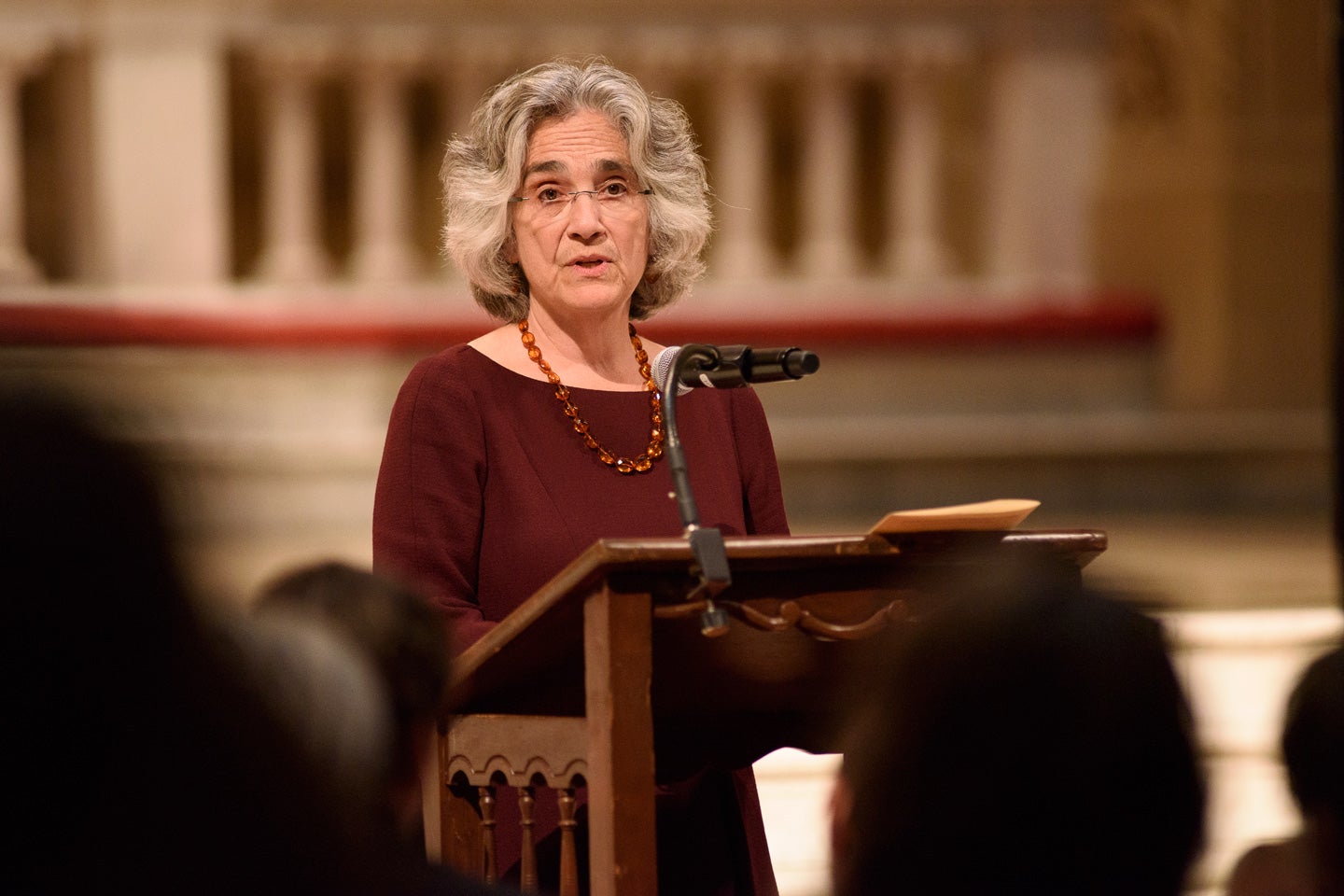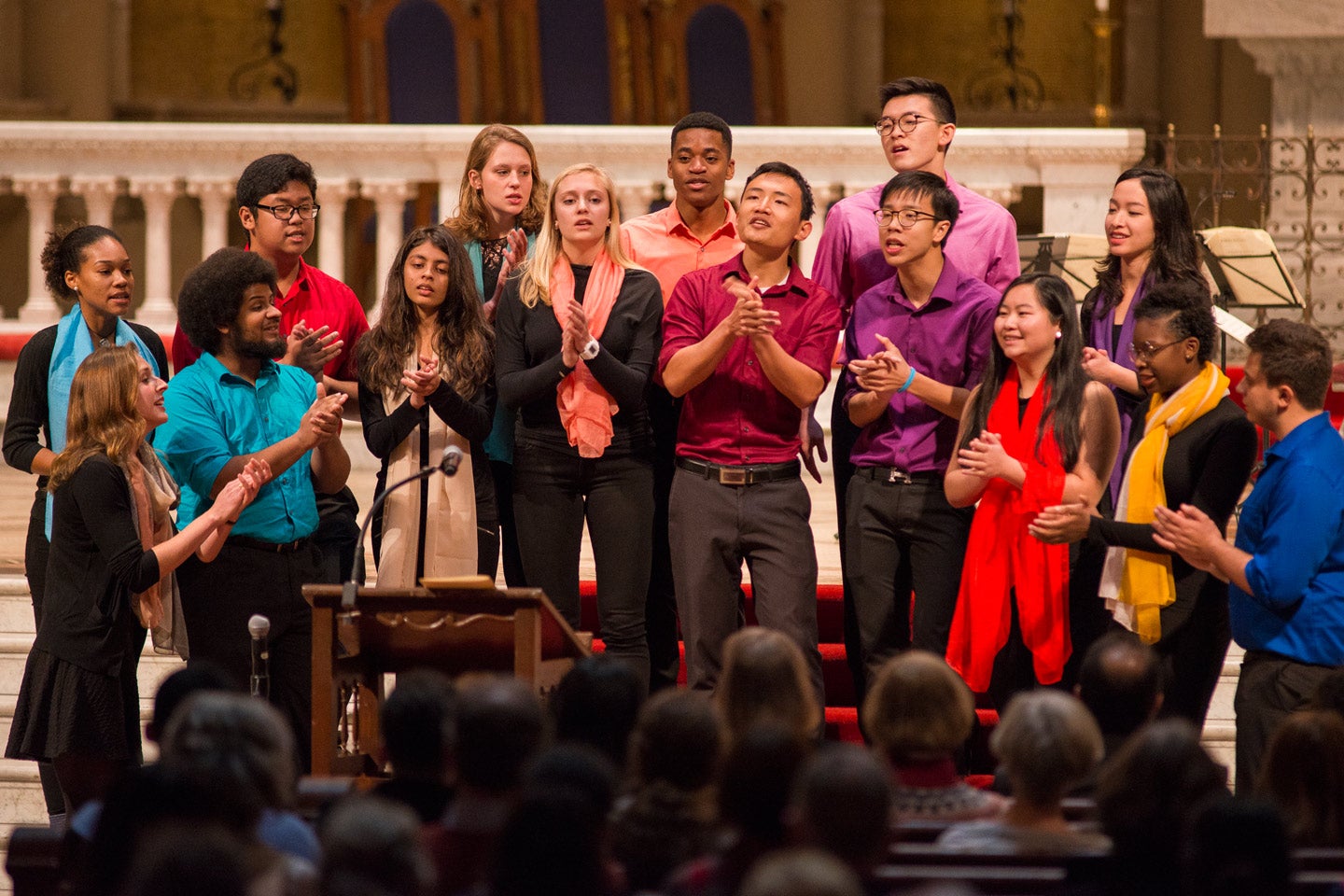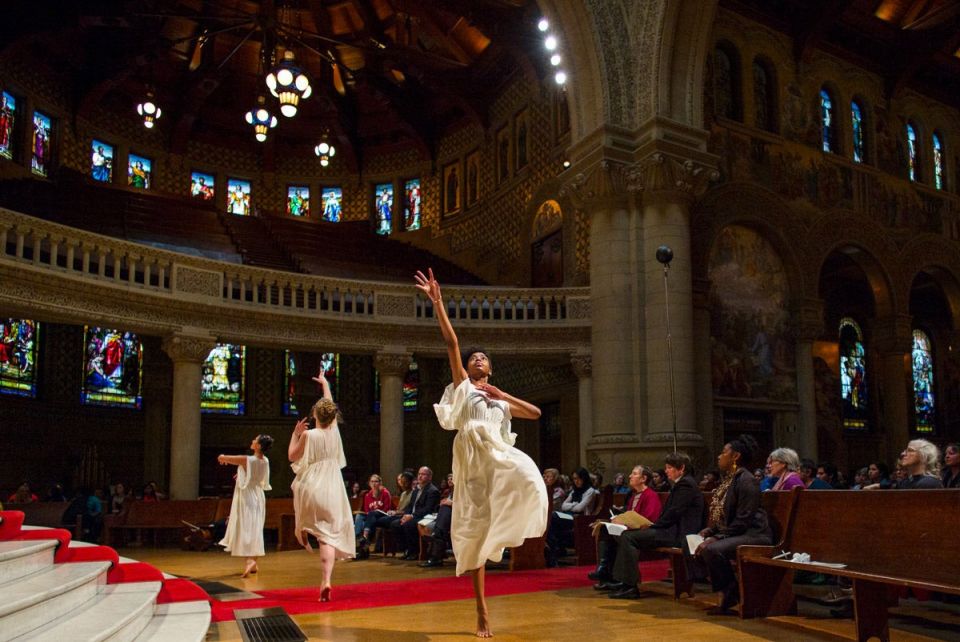Stanford’s incoming provost urged an audience of students, faculty and staff this afternoon to “believe in and work for what is best in people” and to use their education “to build the country worthy of your aspirations.”
“Work to ensure that others can receive similar educational opportunities so that together you can build a more just, more equitable and peaceful world,” said Persis Drell, who will become Stanford’s provost on Feb. 1, at a gathering in Memorial Church.

Incoming Provost Persis Drell offered “Reflections on Being American.” (Image credit: L.A. Cicero)
Drell was one of several speakers at the hour-long program, “Reinvigorating Community – An Inauguration Day Gathering,” which was sponsored by the Office for Religious Life at Stanford.
In her address, “Reflections on Being American,” Drell, the dean of Stanford School of Engineering, described education as the “great enabler” in a country she described as “a mixing pot of values, cultures and backgrounds.”
She spoke of her own “little bit of this, little bit of that” heritage, which includes Jewish grandparents who fled racism and religious persecution in Eastern Europe, and Protestant grandparents, including a planter from Mississippi whose family was on the losing side of the Civil War and a schoolteacher from Minnesota.
“And when I say I’m American I mean that my arms are open to the people who arrived on our doorsteps today, with the same dreams for the future that two of my grandparents had when they arrived here 100 years ago,” she said.
Drell said many Americans have similar, or even more diverse, backgrounds.
“This diversity of background, thought and approach is not only this nation’s heritage and our shared experience, but is our strength as a country,” she said.
“This country is built on a foundation that you have a place here, regardless of your background. You have an opportunity to learn and grow – not only for yourself, but so that you may contribute to the common good.”
To be sure, there are inequities and injustices in the United States and around the world that must be addressed, Drell said.
“Our democracy, enshrined in the U.S. Constitution, affords us rights and responsibilities that I believe empower us to help mend these injustices, create a more equitable society with greater opportunity for all and, together, tackle the world’s urgent challenges,” she said. “Democracy is messy and democracy is hard, but I believe that the opportunity always exists to make our country and our world better. So for me, being American means never losing my optimism about the future.”

Talisman A Cappella offered a medley of traditional African American spirituals and a gospel rendition of “Bridge Over Troubled Water.” (Image credit: L.A. Cicero)
The program began and ended with music. It opened with a performance by the St. Lawrence String Quartet, Stanford’s ensemble-in-residence. It closed with the students of Talisman A Cappella singing “Deep River,” a medley of traditional African American spirituals and a gospel rendition of “Bridge Over Troubled Water,” as they looked out over a sea of tiny white candles bobbing in the pews.
In between, Stanford students and staff members read stirring passages from the letters and speeches of past U.S. presidents, from a sermon by the Rev. Martin Luther King Jr. and from the 1950 “Declaration of Conscience” speech by U.S. Sen. Margaret Chase Smith, one of the most noted early challengers to U.S. Sen. Joseph McCarthy.
Dereca Blackmon, associate dean and director of the Diversity and First-Gen Office, recited the poem inscribed on the pedestal of the Statue of Liberty, which ends: “Give me your tired, your poor / Your huddled masses yearning to breathe free / The wretched refuse of your teeming shore / Send these, the homeless, tempest-tost to me / I lift my lamp beside the golden door.”

Chocolate Heads Movement Band members – visiting artist Yula Cisneros Montoya and juniors Amber Levine and Anika Benons – dance to the singing of Nate Menifield during the gathering. (Image credit: Aaron James Kehoe)
Three performers in flowing, cream-colored gowns danced along the aisles and at the front of the church, accompanied by prayers sung a cappella by another member of Stanford’s Chocolate Heads Movement Band.
Jackson Beard, president of the Associated Students of Stanford University, read from President Franklin Delano Roosevelt’s 1941 State of the Union address, in which he talked about the four essential human freedoms: freedom of speech and expression, freedom of worship, freedom from want and freedom from fear.
Zeshan Hussain, a coterminal student in computer science, read from President Abraham Lincoln’s second inaugural address, in which he urged a country torn apart by the Civil War to come together once again, “with malice toward none, with charity for all.”
The audience heard President John F. Kennedy’s inaugural exhortation: “And so, my fellow Americans, ask not what your country can do for you; ask what you can do for your country.” And an excerpt from the sermon the Rev. Martin Luther King Jr. delivered in the National Cathedral in 1968: “We shall overcome because the arc of the moral universe is long, but it bends toward justice.”
At the end of the program, the audience helped fill the vast church with hundreds of points of light as they turned to one another in the pews to light each other’s candles.
Rabbi Patricia Karlin-Neumann, senior associate dean for religious life, led the audience in a solemn declaration: “We resolve to reinvigorate ourselves and our community. We promise to hold aloft a torch for humanity and dignity. We pledge to cast light in corners of darkness.”